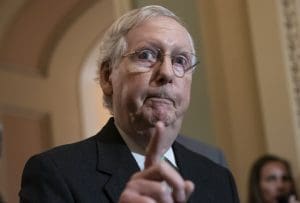McConnell suddenly decides his party's jobs proposal isn't big enough
Days after saying he would not negotiate, the Senate minority leader is already waffling.

Senate Minority Leader Mitch McConnell acknowledged this weekend that his party’s counterproposal to President Joe Biden’s American Jobs Plan isn’t in the range McConnell says is needed to cover investment in infrastructure. But he still indicated no willingness to spend anything on climate, clean energy, or human infrastructure.
“The proper price tag for what most of us think of as infrastructure is about six to $800 billion, which Shelley Moore Capito of my conference has put together and recommended as a bill that’s related to the subject,” McConnell (R-KY) told Kentucky public television station KET on Sunday. “What we’ve got here however is what could best be described as a bait and switch, called infrastructure but much bigger, with a whole laundry list of other things.”
McConnell had said on May 3 that he and his party are only “open to doing a roughly $600 billion package” and had no interest in negotiating higher. “If it’s gonna be about infrastructure,” he told reporters, “let’s make it about infrastructure.”
The GOP plan would contain only about a third of what the White House has suggested is needed to invest in the nation’s infrastructure. But the current Senate GOP proposal of $568 billion does not even fall within McConnell’s slimmed-down range.
The American Jobs Plan is a $2.25 trillion proposal that contains investment in roads, bridges, transit, water systems, clean energy, broadband, housing, child care, and caregiving infrastructure.
McConnell tasked Capito (R-WV) with devising a counterplan. Capito said on April 14 that she was aiming for a “sweet spot” of between $600 billion and $800 billion.
Sen. John Cornyn (R-TX) suggested on April 18 that $800 billion worth of “core infrastructure” could pass with bipartisan support. Sen. Mitt Romney (R-UT) complained that $800 billion was “a little high.”
Republican Sens. John Barrasso (WY), Mike Crapo (ID), Pat Toomey (PA), and Roger Wicker (MS) released what they called a $568 billion plan on April 22, focusing on highway, water, and broadband infrastructure and stripping out all of the climate, housing, and caregiving funds that Biden requested.
That figure was actually far less than meets the eye. A Washington Post analysis revealed that about $379 billion of Capito’s proposal is baseline spending, the same amount of money that would already be allocated anyway, adjusted for inflation — meaning the GOP proposal calls for only $189 billion in additional spending, or 92% less than Biden’s plan.
McConnell said on May 3 that he and his party are only “open to doing a roughly $600 billion package” and had no interest in negotiating higher. “If it’s gonna be about infrastructure,” he told reporters, “let’s make it about infrastructure.”
While Capito and McConnell have both painted climate, clean energy, housing, child care, and caregiving infrastructure as not really infrastructure, polls show the public disagrees.
A Monmouth University poll released April 26 found that 68% of Americans back Biden’s $2.25 trillion proposal and 29% oppose it.
An April 22 Data for Progress poll found that 76% of voters believe it “very” or “somewhat” important to include investments to “help America combat climate change and create a thriving clean energy economy” in the package. An early April poll by the same group along with Invest in America found 74% support for investment in the “care economy” and 64% support for investment in “clean energy.”
A Morning Consult/Politico survey released on April 14 found 54% of American voters believe caregiving “can be considered part of American infrastructure”; 53% said the same of child care.
Biden has repeatedly indicated a willingness to make a bipartisan deal, but warned that he will not allow Republicans to lowball him as they did with the $1.9 trillion American Rescue Plan earlier this year.
“If like last time they come in with one-fourth or one-fifth of what I’m asking and say that’s our final offer,” he told reporters on April 29, “then no, no go.”
If the Democratic majorities in the House and Senate stay united, they can pass Biden’s plan without a single GOP vote.
Published with permission of The American Independent Foundation.
Recommended

Biden calls for expanded child tax credit, taxes on wealthy in $7.2 trillion budget plan
President Joe Biden released his budget request for the upcoming fiscal year Monday, calling on Congress to stick to the spending agreement brokered last year and to revamp tax laws so that the “wealthy pay their fair share.”
By Jennifer Shutt, States Newsroom - March 11, 2024
December jobs report: Wages up, hiring steady as job market ends year strong
Friday’s jobs data showed a strong, resilient U.S. labor market with wages outpacing inflation — welcome news for Americans hoping to have more purchasing power in 2024.
By Casey Quinlan - January 05, 2024
Biden’s infrastructure law is boosting Nevada’s economy. Sam Brown opposed it.
The Nevada Republican U.S. Senate hopeful also spoke out against a rail project projected to create thousands of union jobs
By Jesse Valentine - November 15, 2023








































































